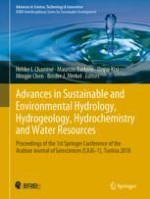2019 | OriginalPaper | Chapter
Geochemical and Isotopic Marks for Tracing Groundwater Salinization: Santiago Island, Republic of Cape Verde, Case Study
Authors : Paula M. Carreira, António Lobo de Pina, Alberto Mota Gomes, José Manuel Marques, Fernando Monteiro Santos
Published in: Advances in Sustainable and Environmental Hydrology, Hydrogeology, Hydrochemistry and Water Resources
Publisher: Springer International Publishing
Activate our intelligent search to find suitable subject content or patents.
Select sections of text to find matching patents with Artificial Intelligence. powered by
Select sections of text to find additional relevant content using AI-assisted search. powered by
